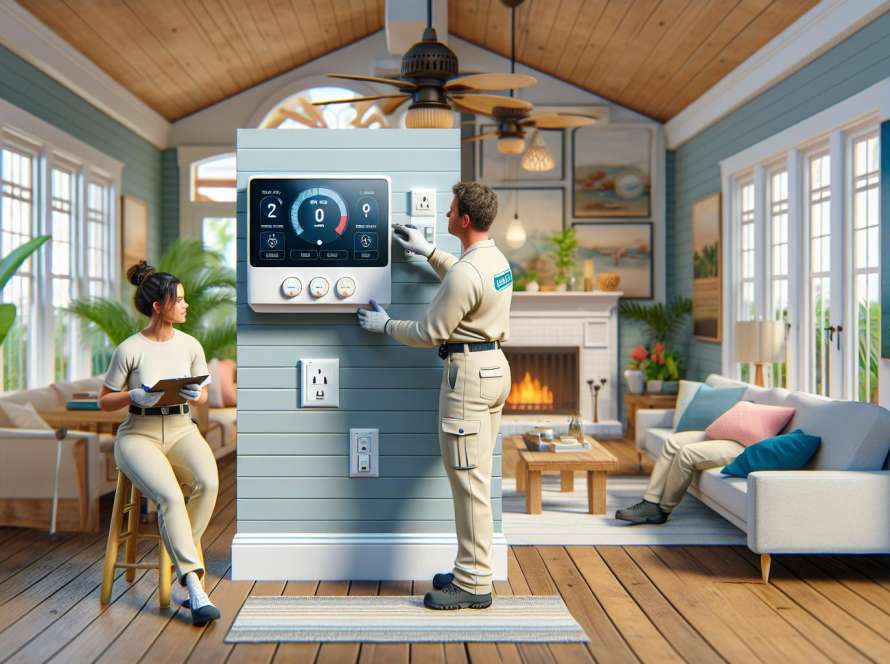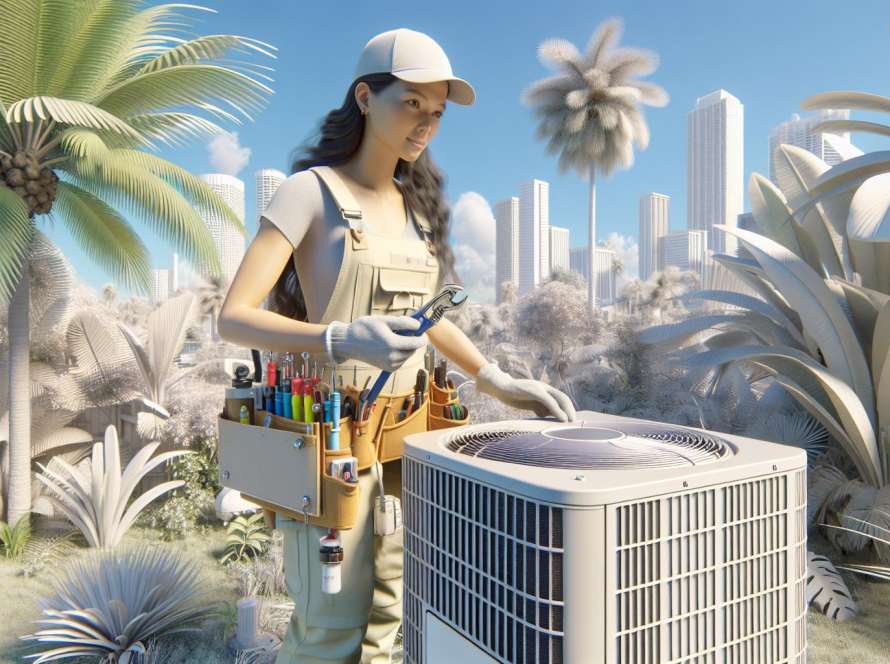When it comes to keeping our Florida homes cool and comfortable, choosing the right air conditioning system is crucial. With the scorching heat and humidity that we face, making an informed decision can make all the difference in our daily lives. From central air conditioning to ductless mini-split systems, the options can be overwhelming. But fear not, as we’re here to guide you through the process and help you make the optimal choice for your specific needs.
Our goal is to provide you with expert insights and practical advice on selecting the most efficient and cost-effective air conditioning solution for your Florida home. By understanding the unique climate challenges we encounter in this sunshine state, we can tailor our choices to ensure maximum comfort and energy savings. So, let’s dive in and explore the best air conditioning options that will keep us cool and collected, no matter how high the temperatures soar.
Understanding the Climate Challenges in Florida
Florida’s unique climate presents homeowners with distinct challenges when it comes to choosing the right air conditioning system. Here’s a breakdown tailored to different experience levels:
For Beginners: Weather Insights and Basic Considerations
- Florida experiences high heat and humidity levels throughout the year.
- Summer temperatures often exceed 90°F with high humidity levels.
- Choosing an energy-efficient system is crucial for cost savings.
For Intermediate Homeowners: System Recommendations
- Consider a central air conditioning system for consistent cooling throughout the house.
- Opt for a system with humidity control to combat Florida’s high moisture levels.
- Evaluate ductwork for potential leaks or inefficiencies that can impact cooling.
- Explore ductless mini-split systems for zone cooling and energy efficiency.
- Invest in a smart thermostat for remote temperature control and energy savings.
- Schedule annual HVAC maintenance to ensure optimal performance in Florida’s climate.
By understanding Florida’s climate challenges and considering these tailored recommendations, homeowners can select an air conditioning system that provides maximum comfort and energy efficiency in the Sunshine State.
Central Air Conditioning: Pros and Cons

In Florida, where temperatures can soar and humidity levels are high, central air conditioning is a popular choice for homeowners looking to maintain a comfortable indoor environment. Here’s a breakdown of the pros and cons to help you make an informed decision:
For Beginners: Understanding the Basics
- Pros:
- Efficient cooling for the entire home.
- Consistent temperature control in all rooms.
- Increases home value.
- Cons:
- Higher upfront cost compared to other systems.
- Requires professional installation.
- Recommendation: For beginners, central air conditioning is a straightforward and effective option that provides whole-house cooling benefits when facing Florida’s intense heat.
For Intermediate Users: Enhancing Your Cooling Experience
- Pros:
- Better air quality with proper filtration.
- Integrated humidity control for comfort.
- Smart thermostat compatibility for energy savings.
- Cons:
- Regular maintenance needed for optimal performance.
- Ductwork inspection may be required.
- Recommendation: Intermediate users can benefit from the enhanced features of central AC, such as humidity control and smart thermostat integration, for a more tailored cooling experience in Florida.
- Pros:
- Zoning capabilities for personalized cooling.
- High energy efficiency with modern models.
- Compatibility with HEPA filters for improved indoor air quality.
- Cons:
- Complex installation may require professional expertise.
- Investment in regular maintenance for longevity.
- Recommendation: Experts can maximize the benefits of central air conditioning by customizing zoning systems, selecting energy-efficient models, and incorporating advanced air quality enhancements tailored to Florida’s climate challenges.
When choosing a central air conditioning system for your Florida home, consider your comfort needs, budget, and desired features to ensure optimal performance and efficiency throughout the year. Remember to consult with HVAC professionals for personalized recommendations and installation guidance tailored to your specific requirements.
Ductless Mini-Split Systems: The Advantages
For Beginners: Easy Installation and Zone Cooling
- Simple installation process: no ductwork needed
- Individual zone control for personalized comfort
- Energy-efficient operation saves on utility bills
For Intermediate Users: Enhanced Energy Efficiency and Flexibility
- High Energy Efficiency Ratio (EER) for cost savings
- Ability to cool specific zones based on usage
- Options for heating and cooling with dual functionality
- Advanced features like programmable thermostats for precision control
- Enhanced indoor air quality with multi-stage filtration
- Customizable options for specialized cooling needs
Remember, when considering a ductless mini-split system for your Florida home, factor in your specific comfort requirements and budget constraints. It’s always beneficial to consult HVAC professionals for tailored advice on selecting and installing the best system for your needs.
Energy-Efficient Options for Florida Homes
When it comes to energy-efficient options for cooling Florida homes, there are various choices available that cater to different user experience levels. Whether you’re a beginner looking for simple solutions or an expert seeking advanced features, optimizing your air conditioning system for efficiency is key.
For Beginners: Efficient Cooling Basics
For those new to optimizing energy efficiency in their homes, here are some simple yet effective tips:
- Utilize Programmable Thermostats: Set your thermostat to adjust the temperature based on your schedule to avoid unnecessary cooling when you’re not home.
- Regular Maintenance: Keeping your HVAC system clean and well-maintained ensures it operates efficiently.
- Seal Air Leaks: Prevent cool air from escaping by sealing gaps and cracks around windows and doors.
- Consider Energy Star-rated Systems: Look for energy-efficient models when choosing a new air conditioning system.
For Intermediate Users: Energy-Saving Upgrades
If you’re ready to take your energy efficiency to the next level, consider these upgrades:
- Invest in Zoned Cooling: Opt for a system that allows you to cool specific zones of your home, maximizing efficiency.
- Enhanced Air Filters: Upgrade to high-efficiency air filters to improve indoor air quality and reduce energy consumption.
- Dual-Function Systems: Choose a ductless mini-split system that offers both heating and cooling functionalities for year-round comfort.
- Smart Thermostats: Upgrade to a smart thermostat for precise temperature control and energy savings.
For Experts: Advanced Efficiency Features
For those well-versed in energy-efficient solutions, here are some advanced features to consider:
- Variable Speed Air Handlers: These systems adjust airflow based on demand, maximizing efficiency.
- Energy Recovery Ventilators: Improve indoor air quality while reducing energy consumption.
- Geothermal Heat Pumps: Utilize the constant temperature of the earth for efficient heating and cooling.
- Solar-Powered Systems: Consider solar energy to power your air conditioning system and reduce utility costs.
By tailoring your energy-efficient choices to your comfort needs and expertise level, you can enhance the cooling efficiency of your Florida home. Consult HVAC professionals for personalized recommendations based on your specific requirements.
Maintaining Your Air Conditioning System

When it comes to Maintaining Your Air Conditioning System, regular upkeep is key to ensuring optimal performance and longevity. Whether you’re a beginner looking to start on the right foot or an expert seeking advanced maintenance techniques, here are some tips tailored to your experience level:
For Beginners: Basic Maintenance Tips
- Change air filters regularly to promote efficient airflow.
- Clear debris around the outdoor unit for proper ventilation.
- Inspect for leaks in the refrigerant line and ductwork.
- Schedule annual tune-ups with a professional HVAC technician.
- Keep the area around the indoor unit clean and unobstructed.
For Intermediate Users: Enhancing Maintenance Practices
- Invest in a programmable thermostat for increased energy efficiency.
- Consider installing a UV light to reduce microbial growth.
- Explore duct sealing to prevent air leaks and improve airflow.
- Learn how to calibrate your thermostat for accurate temperature readings.
- Implement regular coil cleaning to maintain system efficiency.
- Upgrade to a smart thermostat for personalized cooling schedules.
- Opt for regular coil inspections to identify and address issues promptly.
- Explore zoning systems for tailored temperature control in different areas.
- Consider a maintenance plan with your HVAC provider for comprehensive service.
- Evaluate insulation levels for enhanced energy savings and comfort.
Remember, maintenance plays a crucial role in the performance of your air conditioning system. By following these tips suited to your expertise level, you can ensure your system runs smoothly and efficiently throughout the year.
Conclusion
Ensuring optimal air conditioning in Florida homes is crucial for comfort and efficiency. By following tailored maintenance tips based on your experience level, you can enhance the performance and longevity of your system. From beginners changing air filters regularly to advanced users upgrading to smart thermostats, there are various ways to keep your AC running smoothly. Remember, proper maintenance not only improves system operation but also helps you save on energy costs in the long run. By taking proactive steps to care for your air conditioning system, you can enjoy a cool and comfortable living environment year-round.

